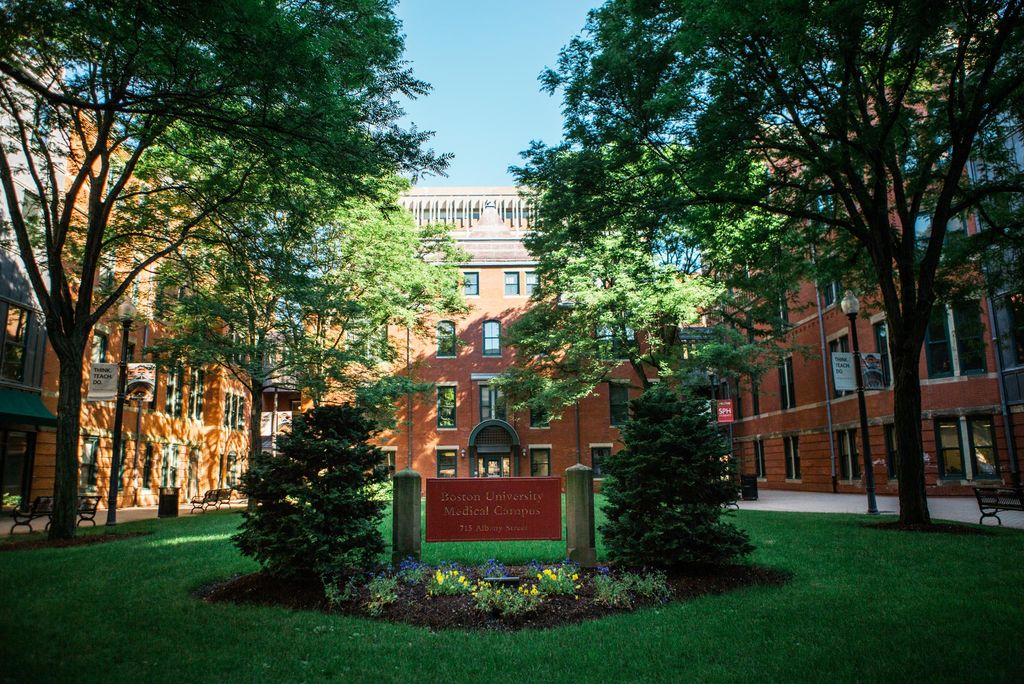BUSM Will Graduate Students Early to Help Hospitals
 The BU School of Medicine and the other three Bay State medical schools have agreed to the commonwealth’s request to move up the graduation dates of fourth-year medical students, allowing them to join doctors on the frontlines of the coronavirus pandemic up to eight weeks earlier than they normally could. Photo by Janice Checchio
The BU School of Medicine and the other three Bay State medical schools have agreed to the commonwealth’s request to move up the graduation dates of fourth-year medical students, allowing them to join doctors on the frontlines of the coronavirus pandemic up to eight weeks earlier than they normally could. Photo by Janice Checchio
Anticipating a surge in the number of COVID-19 hospital patients, the deans of the four Massachusetts medical schools have agreed to the state’s request to move up the graduation dates of their fourth-year medical students, allowing them to join doctors on the frontlines of the pandemic up to eight weeks earlier than they would have been able to.
For the 192 fourth-year Boston University School of Medicine students, it means they will graduate April 17 instead of May 17, and if they choose to, they can begin work immediately in area hospitals to help a healthcare system facing an unprecedented crisis of sick patients. Massachusetts has more than 1,800 COVID-19 cases; one month ago it had one known case.
In a conversation on Wednesday with the deans of the medical schools at BU, Harvard, Tufts, and the University of Massachusetts, Marylou Sudders (CAS’76, SSW’78), Secretary of Health and Human Services, urged the schools to move up their graduation dates and promised to expedite the licensing of the state’s approximately 700 fourth-year medical students. Students who would normally graduate in mid-May and begin an internship in mid-June will graduate in mid-April and be available to work in area hospitals.
Your class is clearly graduating at one of the most medically challenging times of the last century.
Karen Antman, dean of MED and provost of the Medical Campus, says the majority of the school’s fourth-year students should have completed all of the requirements for graduation and been approved by the school’s student evaluation and promotions committee to graduate by April 13. Once they apply, and are approved, for a limited license to practice as an intern at a teaching hospital, they will be able to help care for the possible surge of coronavirus patients in area hospitals. They could also provide care, under supervision, for sick patients in venues being expanded to care for the increasing number of patients. Such service would be elective and would last as long as eight weeks, during the period between graduation and the beginning of an internship. The service could be in Boston or at a graduate’s match hospital, if that hospital is located in a state that allows such an arrangement.
In a letter sent to fourth-year students on Thursday, Antman said graduates will be able to choose whether to apply for a Massachusetts license or move to the location of their residencies. At a press conference Thursday alongside Governor Charlie Baker, Sudders said the state would be prepared to provide “almost automatic 90-day provisional licenses” to speed up the process of getting the graduates into the hospital system.
“Your class is clearly graduating at one of the most medically challenging times of the last century, and will shortly be an important part of our country’s response to the COVID-19 challenge,” Antman wrote. “We are proud of the physicians that you will soon be, and for the role that you will play in the care of your patients.”
NYU’s Grossman School of Medicine announced Wednesday that it is planning to allow its fourth-year students to graduate early and that 69 students to date had volunteered.
Priya Garg, MED associate dean of medical education, says she is confident that their students have met the school’s program objectives and are ready to care for patients under supervision. She says the accelerated graduation is clearly needed because coronavirus cases are increasing daily in Massachusetts, as they are across the United States.
“We may need every physician we can get,” Antman says, “based on what has happened in Wuhan and Italy, and what is happening in New York. The number of cases in Boston has not yet peaked. Our case numbers are still going up.”
Once new doctors are fully credentialed, she says, “they provide care just like other residents at teaching hospitals.”
Of MED’s fourth-year students, 55 plan to do their residency in Massachusetts, 30 in California, and 21 in New York. Internal medicine, with 41 students, is the most popular specialty, 24 are specializing in general surgery, 15 in pediatrics, 15 in emergency medicine, 13 in obstetrics/gynecology, and 12 in family medicine.
This BU Today story was written by Art Jahnke.
View all posts